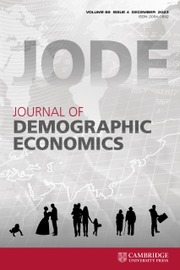Before the Industrial Revolution, most scientists considered fertility, mortality and population as interacting with economic circumstances. When Khaldun (Reference Khaldun and Rosenthal1377) pioneered classical economics, he described how population interplays with the rise and decline of cities by allowing a deeper division of labor and generating increasing returns to scale. When, in the 17th century, Petty (Reference Petty1687) compared the relative development of England, France, and Holland, population was at the center of his calculations, both as an outcome and source of wealth. And, according to the French physiocrats (Mirabeau Reference Mirabeau1756) as well as Bruckner (Reference Bruckner1768), who foreshadowed the Malthusian view on population checks by half a century, population needed to be incentivized to grow.
In the subsequent century and a half, economists mostly abandoned demographics. In his Nobel lecture, Becker (Reference Becker1993) explained why: “Malthus’s conclusion that fertility would rise and fall as incomes increased and decreased was contradicted by the large decline in birth rates after some countries became industrialized (. . .). The failure of Malthus’s simple model of fertility persuaded economists that family size decisions lay beyond economic calculus. The neoclassical growth model reflects this belief, for in most versions it takes population growth as exogenous and given.” Meanwhile, demography developed as a science, forging ties with the other social sciences, such as sociology and anthropology. It is thanks to Becker that economists became interested again in the topics we are studying today, including fertility and population, marriage and divorce, and the intra-family dynamics among husbands, wives, parents, and children.
The Journal of Demographic Economics (JODE), which is being launched with this inaugural issue, is intended to be the premier professional outlet for what has become a vibrant and flourishing subfield within economics. Demographic variables, such as mortality, fertility, marriage, and migration, are all affected by economic trends. Economic incentives in turn affect households, firms and government decisions thereby inducing demographic changes. Research is needed in this field, but with a strong methodological discipline, promoting the use of the same language and of a commonly understood methodology. The objective of this journal is to encourage such research, exploiting the complementarities between theory and empirics and encouraging interdisciplinary collaborations between demographers and economists.
JODE will therefore welcome both empirical and theoretical papers on issues relevant to demographic economics with a preference for combining abstract economic or demographic models together with data to highlight major mechanisms of the interplay between demographics and economics. JODE intends to be the main demography and economics outlet for empirical contributions that are firmly grounded in theory as well as theoretical papers that are motivated by empirical regularities and findings. JODE will emphasize quality over quantity by publishing a small number of high quality papers, between 12 and 16 per year.
JODE is published by Cambridge University Press, an academic publisher that is known in economics through The Journal of Economic History, Econometrics Review, Macroeconomic Dynamics, as well as the Journal of Wine Economics. JODE will be the successor of Louvain Economic Review and benefits from its indexation in several databases. Louvain Economic Review was first published in 1929 (under the name “Bulletin de l’Institut des Sciences Economiques”) and it published its last volume in December 2014.
JODE was introduced last spring through a strong conference that brought together leading scholars of demographic economics. Alice Schoonbroodt and the two of us organized the event, which was funded by the Clarence Tow Lecture Series. It is at this conference that we decided to commemorate Professor Becker in the inaugural issue of JODE. Becker is one of the most influential scientists of the 20th century, as recognized by the Nobel Memorial Prize in Economic Sciences awarded to him in 1992.
The following eight mini essays are all penned by highly prominent academics, some of whom former Becker students, to dissect Becker’s influence on and legacy in various different subfields of demographic economics. An introductory piece by Aloysius Siow precedes these highly informative essays and sets in personal perspective the monumental impact Becker has had on the economics profession in general and demographic economics in particular.
The special section in honor of Becker is followed by two research papers that are representative of how one can combine theory with data by various degrees to assess mechanisms underlying choices made by individuals.
We would like to end this editorial by thanking all the friends and colleagues who encouraged us to initiate this promising new venture.


